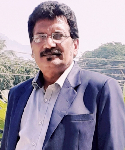| Biography | |
|---|---|
 Prof. Arup Ratan Bandyopadhyay University of Calcutta, India |
|
| Title: ASSOCIATION OF DIGIT RATIOS (2D:4D) AND AGE AT MENOPAUSE: POSSIBILITY OF AN ECONOMISING BIOMARKER | |
| Abstract:
It remains uncertain whether age at menarche is associated with age at menopause. Some studies report that women with early menarche also have early menopause. Other studies report that women with early menarche have late menopause, or they report no association. The duration of the reproductive period may be an indicator of the cumulative endogenous exposure to estrogens and progestogens during life course and is associated with risk of breast cancer and endometrial cancer. Moreover, study suggests that age at menarche is a strong indicator for the duration of women’s reproductive period. On the other hand, 2D:4D ratio used for testing different traits related to androgenisation and estragenisation during critical periods of prenatal development and the ratio is age stable including less influenced by allometry. The underlying mechanism for the association between 2D:4D and prenatal sex hormone levels may be the action of the Homeobox genes, which control the differentiation of digits but also of the gonads, that is, testes and ovaries. In this background, the present study conducted on 187 apparently healthy ever married natural post-menopausal women (46.78± 1.71 Years) without nullipara from Bengalee Population, India. Lengths of the second a fourth fingers were measured by placing the bottom tip of a slide callipers (accurate to 0.01 mm) midline of the basal crease of the finger and extending to the tip without exerting pressure, following standard technique. No bilateral differences were found on digit ratio value, participants were divided into two groups as low 2D:4D ≤ 50th percentile and high 2D:4D ≥ 50th percentile. Examination on the association of digit ratio and age at menopause revealed strong association (p<0.001) with higher age at menopause and higher 2D:4D digit ratio. However, the present study did not find any association with digit ratio with socio demographic variables such as, occupation, education and parity. The findings might encourage studies of the independent role of duration of the reproductive period on the risk of breast cancer and endometrial cancer, since these cancers have been associated with exposure to estrogens and progestogens and the present study envisaged additional possible utility of 2D:4D ratio as economising biomarker. | |
| Biography:
Professor Bandyopadhyay obtained his 1st class Bachelor of Science Honours degree in Anthropology and a Master of Science degree from the University of Calcutta with esteemed NATIONAL SCHOLARSHIP, Govt. of India. Subsequently, obtained an M.Phil degree in Environmental Sciences, he also was awarded with the prestigious Junior Research Fellowship conferred by UGC in 1987 to continue his PhD in selection and polymorphism serum protein (Haptoglobin) and awarded PhD in1992; he was the first recipient of a PhD in Science (Anthropology) with a UGC fellowship from the University of Calcutta. He received the prestigious Merit Award (1991) for his applied research in the area of neonatal medical genetics from, University of Calcutta and recipient of the Young Scientist Award for his contribution in Human Genetics from the Indian Science Congress (The apex body of Science, India) as the first recipient from Department of Anthropology, University of Calcutta. He was President of Anthropological and Behavioral Sciences section of the Indian Science Congress in its centenary year in 2013 and awarded with Outstanding Scientist Award recipient, 2nd International Scientist Awards on Engineering, Science, and Medicine VISA AWARDS 2019. He received nine national extra-mural research grants as Principal Investigator, including an international collaboration grant from the British Council for collaboration with the Roslin Institute, University of Edinburgh. Through his research, Professor Bandyopadhyay has published more than one hundred anthropological research papers in national and international journals on medical genetics, evolutionary biology, forensic anthropology, dental anthropology, public and reproductive health in relation to genes, cytogenetic and anthropometric variables of non-communicable disease, dermatoglyphics in medical and psychiatric disorders, and population genetics and human rights issues of India. As member of the Asiatic Society, the Indian Science Congress Association, Indian Academy of Forensic Sciences, and the Indian Anthropological Society, Professor. Bandyopadhyay is also the founder member of The Indian National Confederation of Anthropological Association (INCAA) and recently nominated as Vice President of Indian Anthropological Society. He is one the National Advisory Committee for the prevention of Beta-Thalassemia and was a former Organizing Secretary of the International Union of Anthropological and Ethological Sciences. Professor Bandyopadhyay was four-time Head of the Department and Convener of the research advisory board in Anthropology at the University of Calcutta. Prof. Bandyopadhyay was the Member of the Program Committee of the International Conference on Gynecology, Obstetrics and Reproductive Medicine (GORM 2018) Bangkok 5-7, January, 2018and International Conference on Gynecology, Obstetrics and Reproductive Medicine (GORM 2018) Bangkok 5-7, January, 2018 and Member of the Program Committee World Congress on Breast Cancer, Gynecology and Women Health (CPD Accredited), Bangkok September 06-07, 2018. Recently, he has been the Advisory Board and Faculty Member of the 4th Global Cancer Summit (2021), International Collaborative and delivered plenary lecture (2021) in 56th Congress of Anthropological Society of Serbia with International Participation Conference. In COVID 19 situation Prof. Bandyopadhyay, already delivered five National and International webinars. | |
